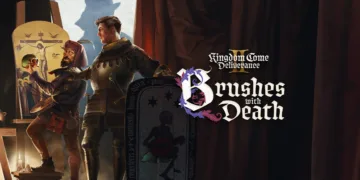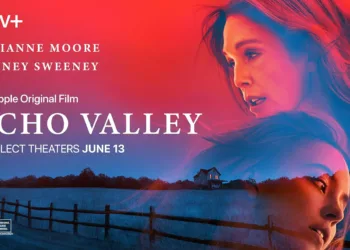We exist in the quiet desperation of the roles we are given, and sometimes, in the roles we invent to escape. Deep Cover begins here, in this space of profound want. We meet three souls adrift in the London fog of their own perceived failures: Kat (Bryce Dallas Howard), an improv teacher whose own life feels static; Marlon (Orlando Bloom), an actor shackled to the ghost of a pizza advertisement, yearning for the gravitas of a new skin; and Hugh (Nick Mohammed), a man so lost in the digital architecture of his IT job that human connection is a foreign script.
They are a congregation of the unfulfilled. Into this void steps a grizzled authority figure, Billings (Sean Bean), with a proposition that is both absurd and seductive: to use the art of invention to infiltrate the underworld. He asks them not just to act, but to become. The central rule of their craft—to accept a reality and build upon it with “yes, and…”—is twisted from a theatrical exercise into a terrifying pact with oblivion, a promise of chaos accepted and then escalated.
Masks Worn by Phantoms
In this theater of criminality, the performances become a study in the desperation of identity. Orlando Bloom’s Marlon is a fascinating spectacle of becoming. He does not simply play a hard-man; he claws at the persona, wearing it with the ferocious commitment of a man who despises the self he is leaving behind.
Every growled line and postured threat is a rejection of the triviality that has defined him, and in this desperate transformation, he finds the film’s most authentic notes of dark humor. Bryce Dallas Howard provides the necessary gravity as Kat, her performance a constant, quiet resistance to the encroaching artifice.
She is the anchor to a reality the others are so eager to abandon, her grounded presence a reminder of the real stakes beneath the layers of performance. Her chemistry with the others is palpable, yet the script often seems to fear her potential, reining in the chaos she might otherwise unleash.
Nick Mohammed’s Hugh is perhaps the most painfully human—a soul without a mask, whose attempts at deception are so transparent they become a different kind of performance, a portrait of pure, unvarnished awkwardness.
The supporting figures—Ian McShane, Paddy Considine—are archetypes, ghosts from a thousand other crime stories, their gruff gangsterisms providing little new terrain for these actors to explore. They are echoes in a familiar space, their menace muted by repetition.
The Unwritten Scene and the Jarring Cut
A film built on the premise of improvisation must, at some level, embrace chaos. Herein lies the central paradox. The idea of performers using their skills to navigate the unscripted terror of the underworld is a brilliant philosophical starting point.
When the film allows this—in a bungled sting where an ill-timed “yes, and…” sends ripples of disaster, or when Kat must invent a new self on the spot to deceive her friends—it touches a thrilling nerve. These moments, however, are fleeting. For a story about invention, it too often retreats to the safety of a script, its dialogue for the “improvised” scenes feeling painstakingly constructed.
The film’s very structure seems to be at war with itself. It lurches between broad, weightless comedy and jarring bursts of brutal violence, an uneasy truce between slapstick and annihilation.
This tonal dissonance could have been a potent reflection of the characters’ fractured state, but it feels less like a deliberate choice and more like indecision. The generic scaffolding of a gang-war plot further confines the narrative, forcing these supposedly free-thinking characters into the predictable rhythms of a story they cannot improvise their way out of.
The Glare of the Digital Void
There is a certain hollowness to the film’s visual world, a flatness that speaks to the nature of its existence. This is not the living, breathing London of cinema’s past; it is a sterile backdrop, a series of non-places rendered with the indifferent gloss of a screen saver.
Director Tom Kingsley’s camera frames the action without passion or a distinct point of view, creating a sense of detachment. The images lack the texture of reality, making the dangers feel distant and the comedy feel forced. During moments of action, the editing becomes frantic and choppy, a flurry of motion that communicates panic but not tension, confusion but not excitement.
This aesthetic is perhaps the film’s most honest statement. It looks and feels like a product of the digital stream, its transient nature built into its very DNA. The lack of a strong visual identity reinforces its disposability, a story designed not to be remembered but to fill a space in a content library, a flicker of light before the next one begins.
Deep Cover premiered at the SXSW London festival on June 4, 2025, and is set to release globally on Amazon Prime Video on June 12, 2025. Deep Cover has been praised for its blend of sharp humor and high-octane action, with standout performances from its ensemble cast.
Full Credits
Director: Tom Kingsley
Writers: Colin Trevorrow, Derek Connolly, Ben Ashenden, Alexander Owen
Producers: Colin Trevorrow, Laurie MacDonald, Walter F. Parkes
Executive Producers: Nik Bower, Ben Ross, Riyoko Tanaka
Cast: Bryce Dallas Howard, Orlando Bloom, Nick Mohammed, Paddy Considine, Sonoya Mizuno, Ian McShane, Sean Bean, Freya Parker, Omid Djalili, Ben Ashenden, Nneka Okoye, Leart Dokle, Sophie Duker, Ania Magliano-Wright, Alexander Owen, Anthony Rotsa, Susannah Fielding
Director of Photography (Cinematographer): Will Hanke
Editor: Mark Williams
Composer: Daniel Pemberton
The Review
Deep Cover
Deep Cover gestures toward a profound exploration of identity and performance but ultimately recedes into the safety of convention. It is a film haunted by the ghost of a better, more daring version of itself. While Orlando Bloom’s desperate commitment offers a brilliant flicker of life, the film's uninspired direction and tonal indecision ensure it remains a hollow echo. It poses a fascinating question about inventing reality but lacks the nerve to follow through, leaving behind not a lasting impression but the quiet hum of a screen gone dark.
PROS
- Orlando Bloom's standout performance is both hilarious and committed.
- The high-concept premise of improv actors as undercover agents is inherently intriguing.
- Brief, sporadic scenes effectively merge the comedic premise with genuine stakes.
CONS
- Flat, uninspired direction that gives the film a generic streaming aesthetic.
- A jarring and inconsistent tone that shifts awkwardly between slapstick and violence.
- The central premise is ultimately underutilized and squandered.
- A predictable plot that relies on tired genre tropes.

















































